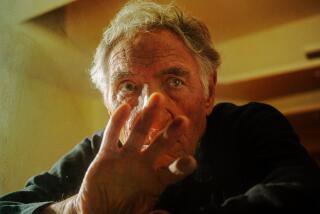Dirk Bogarde; Prolific Actor, Writer
Dirk Bogarde, the British matinee idol who won international acclaim with his roles in art house films such as âDeath in Venice,â died of a heart attack Saturday at his London home, his family said. He was 78.
The actor, who had 60 films to his credit, was also a prolific writer with several volumes of memoirs and seven novels, a number of which became bestsellers.
In learning of his death, director Michael Winner remembered him as a âgracious, charmingâ man.
âPeople forget that Dirk Bogarde was the male hero of Britain for 20 years,â Winner said. âEvery girl in the country was in love with him. He was the United Kingdomâs Leonardo DiCaprio of his day. He was a glamour actor who could turn in a great character performance.â
Bogarde was born Derek Jules Gaspard Ulric Niven Van den Bogaerde on March 28, 1921 in London, the son of a Dutch-born art critic for the Times of London. His mother, whose ancestors were Scottish and Spanish, was an artist and actress by training. As a child, Bogarde had wanted to be a stage actor and performed plays, along with his sister, in an old barn near the familyâs country home. Bogarde found theater work off the stage as a teenager, designing and painting sets while he studied acting. His stage debut came in 1939 when he replaced an ailing actor in a production of J.B. Priestleyâs âWhen We Are Married.â
World War II sidetracked his career, but after service in the army with an intelligence unit--two of Bogardeâs drawings of the Normandy landings are exhibited in the Imperial War Museum in London--he resumed acting. His first substantial film role was in âEsther Waters,â which led to a contract with the prestigious Rank organization and a steady diet of leading parts over the next 15 years.
A versatile, subtle and sensitive actor, Bogarde played everything from melodramatic Cockney roles to light comedy in the âDoctorâ film series (âDoctor at Sea,â âDoctor at Largeâ and âThe Doctorâs Dilemmaâ).
Late in his career, he described himself as âa yellow pages actor,â adding: âIf they canât get the one they want, they look through the yellow pages and find me. Itâs always been my lot to be in other peopleâs shoes.â
The âDoctorâ series was followed by a brief and unhappy spell in Hollywood, the basis for his novel âWest of Sunset,â a biting satire on the society he hated so much. He shot a couple of movies there, including a biopic of composer Franz Liszt, practicing the piano until his fingers bled to perform the part.
Back in England, he found better parts in more complex roles. In 1961, he played a closeted homosexual barrister in âThe Victim,â the first British movie to deal with the problems of homosexual men in public life. The film alienated the fans of his matinee idol days but fueled his career in art house films, which was fine with Bogarde.
âIâm art house, not box office,â he once said.
Internationally, Bogarde established his reputation as a leading interpretive actor after starting to work independently with director Joesph Losey. He won the British film academy award in 1963 for Loseyâs âThe Servant,â and another two years later for John Schlesingerâs âDarling.â
He did his best film work in the first two films of Italian director Luciano Viscontiâs German decadence trilogy. He played the doomed plant manger for the powerful Essenbeck steel company in âThe Damnedâ (1969), and the stricken writer, Gustav von Aschenback, at the center of âDeath in Veniceâ (1971). Many consider âVeniceâ his finest acting performance.
âI didnât think I could do any better,â he said later of his all but silent interpretation of a dying elderly composer enchanted by a handsome teenage boy.
A quiet, contemplative man, Bogarde moved to the south of France in the late 1960s, finding relaxation in painting, writing and tending his garden. He was also known as something of a gourmet.
Bogarde continued in films during the â70s, including the title role in Liliana Cavaniâs âThe Night Porter,â an art house favorite, and the more commercial World War II saga âA Bridge Too Far,â but he spent more of his time in his second career as a writer.
In his books, Bogarde described himself as a solitary figure with a âhermit crab syndrome.â
He dismissed his success in publishing by saying it was only âbecause of my name and all the blue-haired ladies,â alluding to the female fans of his matinee idol days in the â50s.
His titles such as âClosing Ranks,â âAn Orderly Manâ and âBackclothâ were popular and sold well. Several of his poems have been published in an Anthology of Contemporary Poetry.
According to the Daily Mail in London, he returned to England in the late 1980s after being diagnosed with Parkinsonâs disease. The death of his manager, Anthony Forwood, around the same time--âthe man always described, with no further flourish, as his partnerâ--was said to have left him devastated. But leaving behind his beloved 15th century farmhouse in France was difficult.
âIt was real Provence, 400 olive trees, red mud and bare feet,â said Bogarde. âWe had to leave because we lived at the top of a hill and it was no longer possible to go on there. Parkinsonâs and cancer had taken over our lives.â
Despite admitting to growing fatigue, he came out of semi-retirement in 1990 to film âDaddy Nostalgie,â the tragic story of a girl watching her father die, for French director Bertrand Tavernier.
In 1992, he accepted a knighthood after initially refusing the honor.
âThe woman from Downing Street told me I was being selfish. âYou owe it to the people you have entertained with your films and your books. Itâs in honor of them,â she said. So I accepted it,â he said.
He suffered a damaging stroke in 1996 and had been under 24-hour nursing care for the last year.
On Saturday, actress Glenda Jackson, a member of Britainâs parliament, said of Bogarde: âHe was our first home-grown film star. He made some remarkable films.â
Bogardeâs ashes will be scattered in France.
More to Read
Only good movies
Get the Indie Focus newsletter, Mark Olsen's weekly guide to the world of cinema.
You may occasionally receive promotional content from the Los Angeles Times.










